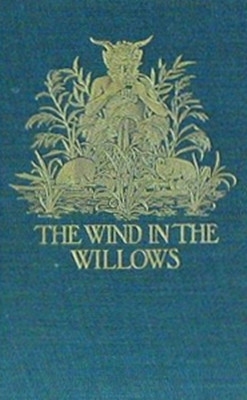And,now, ' said the Badger, after breakfast the next morning, 'we must have a Victory Party. Toad, you must write and invite all our friends for tonight. '
現(xiàn)在,第二天早餐后,獾開(kāi)口道,我們應(yīng)該舉行一個(gè)慶功宴會(huì)。癩蛤蟆,你應(yīng)該寫(xiě)些請(qǐng)柬邀請(qǐng)我們所有的朋友今晚來(lái)這兒。
'What—me do all the work?' said Toad crossly, 'Why…'He suddenly stopped, then said, ' Yes, of course. I'll do every-thing. I'll plan the party, and the singing and—'
什么——我干這所有的活?癩蛤蟆生氣地說(shuō),為什么……他突然停下來(lái),然后說(shuō)道:是的,當(dāng)然。我將照辦,安排一個(gè)派對(duì),又唱又——
'Oh no, ' said the Rat, 'You're not going to sing any of your songs. '
噢,不,水鼠打斷道,你不要再唱你的那些歌了。
'Not just one little song?' asked Toad miserably.
一首都不行嗎?癩蛤蟆傷心地問(wèn)道。
' No, Toady. You know very well that your songs are all about you and how clever you are. They're just one long boast! '
不行,阿癩。你很了解你的歌全是關(guān)于你自己,還有你是多么聰明之類的。那僅僅是些冗長(zhǎng)的吹牛皮罷了!
' Come on now, Toad, ' said the Badger kindly.
好了,蛤蟆,獾和善地說(shuō)。
'You know that you have to change your ways and become a sensible animal.
你知道你得改變你的行事方式,成為一只理智的動(dòng)物。
Why not begin now?
為什么不從現(xiàn)在開(kāi)始呢?
What better moment could there be, on your return to Toad Hall?'
如今你重新返回蛤蟆宅第,還有比現(xiàn)在更好的時(shí)刻嗎?
Toad looked at his three friends' serious faces.
癩蛤蟆看著三位朋友嚴(yán)肅的表情,
For a long while he seemed to be thinking deeply. At last he spoke.
很長(zhǎng)時(shí)間,他似乎沉浸在思考中。最后他開(kāi)口了。
'My friends, you are right, ' he said sadly.
我的朋友,你們是對(duì)的,他難過(guò)地說(shuō)道,
'And I am wrong.
我錯(cuò)了,
From today, I will be a very different Toad. You will never be ashamed of me again. '
從今天開(kāi)始,我將洗心革面,你們將不再會(huì)為我感到羞恥了。
The party was a great success.
晚會(huì)非常成功。
Everyone wanted to hear about the battle, and there was a lot of noisy talking and laughing.
每個(gè)人都想聽(tīng)聽(tīng)那次襲擊,大家在那兒說(shuō)著,笑著,吵吵嚷嚷的。
But Toad was not at all noisy.
但是癩蛤蟆一點(diǎn)也不吵。
He moved quietly round the room, making sure that everyone had enough to eat and drink.
他在房間里靜靜地轉(zhuǎn)悠著,保證大家都有足夠的食品和飲料。
He said very little about the battle, only, 'Oh, it was Badger's clever plan. And the Mole and the Rat did all the hard fighting.
關(guān)于那次戰(zhàn)斗,他只談了一點(diǎn)點(diǎn):哦,那是獾的妙計(jì),鼴鼠和水鼠的英勇作戰(zhàn)。
His three friends watched him with their mouths open in surprise-which pleased Toad very much.
他的三位朋友張大嘴巴吃驚地看著他—這讓癩蛤蟆非常開(kāi)心。
Towards the end of the evening, some of the younger animals started banging on the table and shouting, ' Toad! Song! Mr Toad' s Song! ' But Toad only shook his head gently, and immediately began a quiet conversation with Otter, asking in an interested voice about his children.
晚宴臨近尾聲時(shí),一些年輕的動(dòng)物開(kāi)始敲著桌子叫著:蛤蟆!唱歌!唱首蛤蟆先生的歌!但是癩蛤蟆只是輕輕地?fù)u了搖頭,很快又轉(zhuǎn)過(guò)去靜靜地和水獺聊天,還很感興趣地問(wèn)著他孩子們的情況。
He was indeed a different Toad!
他確實(shí)是改變了!

關(guān)于《風(fēng)雨河岸柳》
這種表現(xiàn)方式,更加深入人心,也更容易被讀者接受。作者細(xì)細(xì)地描寫(xiě)了季節(jié)的流轉(zhuǎn)、大自然的變化,以及動(dòng)物們生活中發(fā)生的點(diǎn)點(diǎn)滴滴。












